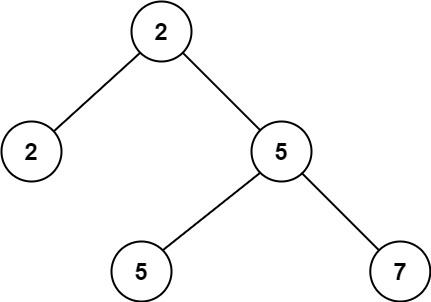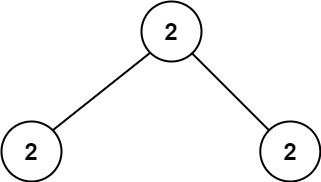Second Minimum Node In a Binary Tree
EasyUpdated: Oct 13, 2025
Practice on:
Problem
Given a non-empty special binary tree consisting of nodes with the non-negative value, where each node in this tree has exactly two or zero sub-node. If the node has two sub-nodes, then this node's value is the smaller value among its two sub-nodes. More formally, the property root.val = min(root.left.val, root.right.val) always holds.
Given such a binary tree, you need to output the second minimum value in the set made of all the nodes' value in the whole tree.
If no such second minimum value exists, output -1 instead.
Examples
Example 1

Input: root = [2,2,5,null,null,5,7]
Output: 5
Explanation: The smallest value is 2, the second smallest value is 5.
Example 2

Input: root = [2,2,2]
Output: -1
Explanation: The smallest value is 2, but there isn't any second smallest value.
Constraints
- The number of nodes in the tree is in the range
[1, 25]. 1 <= Node.val <= 2^31 - 1root.val == min(root.left.val, root.right.val)for each internal node of the tree.
Solution
Method 1 - DFS for Second Minimum
Intuition
The root is always the minimum value. The second minimum must be the smallest value in the tree that is greater than the root. We can traverse the tree and track the smallest value greater than root.val.
Approach
- Store the root value as min1.
- Traverse the tree (DFS or BFS). For each node:
- If node.val > min1, update the answer if it's smaller than current answer.
- If node.val == min1, keep searching its children.
- Return the answer if found, else -1.
Code
C++
struct TreeNode {
int val;
TreeNode *left, *right;
TreeNode(int x) : val(x), left(nullptr), right(nullptr) {}
};
class Solution {
public:
int findSecondMinimumValue(TreeNode* root) {
int min1 = root->val, ans = -1;
function<void(TreeNode*)> dfs = [&](TreeNode* node) {
if (!node) return;
if (node->val > min1) {
if (ans == -1 || node->val < ans) ans = node->val;
} else if (node->val == min1) {
dfs(node->left); dfs(node->right);
}
};
dfs(root);
return ans;
}
};
Go
type TreeNode struct {
Val int
Left, Right *TreeNode
}
func findSecondMinimumValue(root *TreeNode) int {
min1, ans := root.Val, -1
var dfs func(*TreeNode)
dfs = func(node *TreeNode) {
if node == nil { return }
if node.Val > min1 {
if ans == -1 || node.Val < ans { ans = node.Val }
} else if node.Val == min1 {
dfs(node.Left); dfs(node.Right)
}
}
dfs(root)
return ans
}
Java
class TreeNode {
int val;
TreeNode left, right;
TreeNode(int x) { val = x; }
}
class Solution {
public int findSecondMinimumValue(TreeNode root) {
int min1 = root.val, ans = -1;
ans = dfs(root, min1, ans);
return ans;
}
private int dfs(TreeNode node, int min1, int ans) {
if (node == null) return ans;
if (node.val > min1) {
if (ans == -1 || node.val < ans) ans = node.val;
} else if (node.val == min1) {
ans = dfs(node.left, min1, ans);
ans = dfs(node.right, min1, ans);
}
return ans;
}
}
Kotlin
class TreeNode(var `val`: Int) {
var left: TreeNode? = null
var right: TreeNode? = null
}
class Solution {
fun findSecondMinimumValue(root: TreeNode?): Int {
val min1 = root!!.`val`
var ans = -1
fun dfs(node: TreeNode?) {
if (node == null) return
if (node.`val` > min1) {
if (ans == -1 || node.`val` < ans) ans = node.`val`
} else if (node.`val` == min1) {
dfs(node.left); dfs(node.right)
}
}
dfs(root)
return ans
}
}
Python
# Definition for a binary tree node.
# class TreeNode:
# def __init__(self, val=0, left=None, right=None):
# self.val = val
# self.left = left
# self.right = right
def findSecondMinimumValue(root):
min1 = root.val
ans = -1
def dfs(node):
nonlocal ans
if not node:
return
if node.val > min1:
if ans == -1 or node.val < ans:
ans = node.val
elif node.val == min1:
dfs(node.left)
dfs(node.right)
dfs(root)
return ans
Rust
use std::rc::Rc;
use std::cell::RefCell;
// Definition for a binary tree node.
// struct TreeNode { val: i32, left: Option<Rc<RefCell<TreeNode>>>, right: Option<Rc<RefCell<TreeNode>>> }
pub fn find_second_minimum_value(root: Option<Rc<RefCell<TreeNode>>>) -> i32 {
let min1 = root.as_ref().unwrap().borrow().val;
let mut ans = -1;
fn dfs(node: &Option<Rc<RefCell<TreeNode>>>, min1: i32, ans: &mut i32) {
if let Some(n) = node {
let v = n.borrow().val;
if v > min1 {
if *ans == -1 || v < *ans { *ans = v; }
} else if v == min1 {
dfs(&n.borrow().left, min1, ans);
dfs(&n.borrow().right, min1, ans);
}
}
}
dfs(&root, min1, &mut ans);
ans
}
TypeScript
class TreeNode {
val: number
left: TreeNode | null
right: TreeNode | null
constructor(val?: number, left?: TreeNode | null, right?: TreeNode | null) {
this.val = (val===undefined ? 0 : val)
this.left = (left===undefined ? null : left)
this.right = (right===undefined ? null : right)
}
}
function findSecondMinimumValue(root: TreeNode | null): number {
const min1 = root!.val
let ans = -1
function dfs(node: TreeNode | null) {
if (!node) return
if (node.val > min1) {
if (ans === -1 || node.val < ans) ans = node.val
} else if (node.val === min1) {
dfs(node.left); dfs(node.right)
}
}
dfs(root)
return ans
}
Complexity
- ⏰ Time complexity:
O(n)(visit each node once) - 🧺 Space complexity:
O(h)(recursion stack, h = tree height)